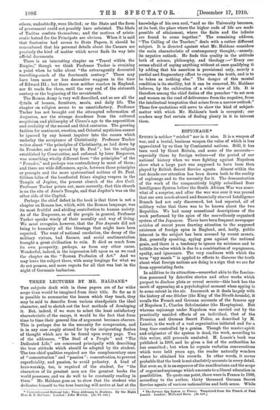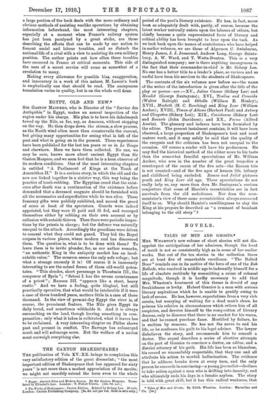ESPIONAGE.*
SPYING is neither "cricket" nor is it nice. It is a weapon of war, and a brutal, business weapon the value of which is less appreciated by us than by Continental nations. Still, it has been used by Great Britain, and some of the accounts— especially those by foreign writers—of the period of our national history when we were fighting against Napoleon show what a large part was supposed to have been then played by British Secret Service agents. Almost within the last decade our attention has been drawn both to the reality of espionage and to the necessity for it. The demonstration of the work of the comparatively highly subsidised Boer Intelligence System before the South African War was some- what of a surprise, and after the war was over it was proved that our own much-abused and financially starved Intelligence Branch had not only discovered, but had reported, all of military value that there was to be known about the two Republics. We had many sensational descriptions of the work performed by the spies of the marvellously organised system of the Japanese. There have been frequent newspaper articles of recent years drawing attention to the supposed existence of foreign spies in England, and, lastly, public interest in the subject has been aroused by recent arrests. But, generally speaking, spying goes against the national grain, and there is a tendency to ignore its existence and to belittle its value which is due to a combination of repugnance, apathy, and ignorance. The very readiness with which the term "spy mania" is applied to efforts to discover the truth about what foreign nations are doing is a sign that we are far from appreciating facts.
In addition to its attraction—somewhat akin to the fascina- tion possessed by detective stories and other works which purport to disclose plots or reveal secrets—this book has the merit of appearing at a psychological moment when spying is to some extent in the air. Inasmuch as it deals largely with the history of one Stieber (the King of the Sleuth-hounds), it recalls the French and German accounts of the famous spy of Napoleon I., Charles Schtilmeister (the Hauptspion). But whereas espionage under Napoleon was carried out by the practically unaided efforts of an individual, that of the Prussian and German Secret Police, as described by M. Lenoir, is the work of a vast organisation initiated and for a long time controlled by a genius. Though the master-spirit and originator of the system is dead, the work, according to this writer, still proceeds unabated. M. Lanoir's book was published in 1908, and he gives a list of the authorities he has consulted ; but when he repeats verbatim conversations which were held years ago, the reader naturally wonders where he obtained his records. In other words, it seems probable that the book is not absolutely accurate in every detail. But even so, it is an exposure of the ramifications and the scope of organised espionage which amounts to a liberal education in possibilities. To quote one point, there were in France in 1908, according to the author, thirty thousand German Secret Service agents of various nationalities and both sexes. While
• The German Spy System in France. Translated from the French of Paul Lanoir. London : Mills and Boca. [5e. net.] a large portion of the book deals with the more ordinary and obvious methods of assisting warlike operations by obtaining information beforehand, the most interesting chapters, especially at a moment when France's railway system has just been paralysed by a great strike, are those describing the efforts that can be made by one nation to foment social and labour troubles, and so disturb the national life of a rival with a view to assisting its own military position. The author points out how often these troubles have occurred in France at critical moments. This side of the , uses of a secret service will come as somewhat of a revelation to many.
Making every allowance for possible bias, exaggeration, and inaccuracy in a work of this nature, M. Lanoir's book is emphatically one that should be read. The anonymous translation varies in quality, but is on the whole well done.























































 Previous page
Previous page